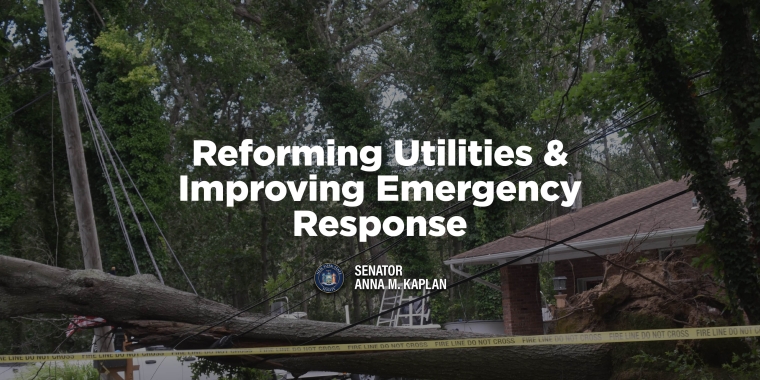
Senator Anna M. Kaplan Introduces Utility Reform Legislation in the wake of Tropical Storm Isaias
Senator Anna M. Kaplan
August 10, 2020

Carle Place, NY (August 11, 2020)-- Today, Senator Anna M. Kaplan (D-Great Neck) introduced a package of legislation to reform the way utility companies respond in emergency situations in order to avoid a repeat of the disastrous response seen on Long Island following Tropical Storm Isaias. Seven days after the Tropical Storm swept through Long Island, thousands of residents are still without power, phones, internet, and television, and utility companies are still unable to provide a clear and realistic timetable for service restoration.
“PSEG LI, Verizon, and Altice have completely failed Long Island, and left us without electricity and critical communications services for an entire week following a storm that didn’t even reach hurricane status. Moving forward, it’s clear we need to put in strict guard rails and consumer protections to ensure that these companies are prepared for the next storm, so that we never go through hell like this again,” said Senator Anna M. Kaplan. “The common-sense legislation I’m introducing today will set standards for the protection of medically frail residents and those with health complications, set a firm timetable for the restoration of power to our first responders and residents, keep our cellular phones running in a blackout, and ensure our residents don’t get a bill for services they didn’t receive. These measures will incentivize these companies to get services up and running right away, and protect the most vulnerable in our communities.”
The seven bills introduced today by Senator Anna M. Kaplan address specific deficiencies in the response by PSEG LI, Altice, and Verizon to the tropical storm and address the undue burden placed on residents and ratepayers:
- Prioritizing Critical Emergency Services and First Responders: This legislation, S8892, seeks to ensure that our police, fire, and ambulance services are prioritized for power restoration within 24 hours. If power cannot be restored in that period, the utility company must provide alternate power sources to ensure these critical facilities can function.
- Keep the Cellular Network Running in an Emergency: This legislation, S8893, would require every owner or operator of cellular network infrastructure in the state to equip the infrastructure with an emergency back-up power source to maintain operation o the network in the case of a total loss of power. Loss of power to the cellular network has been a significant problem during this crisis as it was in the aftermath of Superstorm Sandy.
- Give Ratepayers a Voice During an Emergency: This legislation, S8894, would require any utility (gas, electric, water, steam, or municipality rendering equivalent utility services) and any communications service provider (telephone, cable television, internet service provider) to have a dedicated, 24/7 staffed telephone line solely for the purpose of allowing customers to report service outages. The service needs to have adequate/scalable capacity to handle a mass outage event, and the phone number must be conspicuously posted on the provider’s website homepage and on page 1 of the customer’s bill.
- No Service, No Charge: This legislation, S8896, creates a discount on a consumer’s bill proportionate to the amount of time the customer was without service through no fault of their own. This legislation covers gas, electric, water, and steam utilities, as well as telephone, cable TV, and internet service providers, or any municipality rendering an equivalent service.
- Protecting the most vulnerable in an emergency: This legislation, S8895, provides that those with a documented need for electrical service to maintain their physical health and well-being be provided with alternate sources of power or other accommodations in the event that service cannot be restored within a 24 hour period. This includes but is not limited to generators and off-site accommodation arrangements.
- More Accountability For Fixing Downed Power Lines: This legislation, S8897, would add individuals to the list of those who can report downed power lines to an electric company to start the 36 hour window for that power line to be secured safely. Current law only allows municipal officers to start the time window, slowing the official response to these dangerous situations.
- Setting Standards For Medical Priority Situations: This legislation, S8898, creates a definition for medical needs that encompasses a realistic list of situations that demand priority restoration in an emergency to prevent a rapid and significant decline in a person’s health and well-being. Currently there is no standard to recognize that many medical conditions can be significantly triggered or exacerbated by a continued loss of power and that such conditions will have a significant adverse impact on that individual.
###
related legislation
Share this Article or Press Release
Newsroom
Go to NewsroomLiquor license change will benefit small caterers, owners say
January 3, 2023



Democrats call for Santos to resign
December 29, 2022
